October 2014 Newsletter
Posted on October 14, 2014.
Stay tuned for our January 2015 newsletter!
IN THIS ISSUE
Letter from our Executive Director
Are you on the map? Global Washington is raising the profile of those working in international development and putting them on the map – both figuratively and literally. This week, we are launching a new interactive map to show where our members work and what they do.
Did you know there are 35 Global Washington members working in Kenya? And, 36 members working on solutions to global health challenges? I encourage you to check out the map, look for potential program partners and browse NGOs that align with your interests. We will continually update the map as we gain new members and information changes. To update your data now, please contact us.
Also this month, we are finalizing speakers for our 6th Annual Global Washington Conference on December 3, 2014. Two of our main speakers are Pulitzer Prize winning journalist Sonia Nazario and the President & CEO of the U.S. fund for UNICEF, Caryl Stern. Join your colleagues in discussions about NGO-business partnerships, new financial models and productive failures. This year’s conference will bring you Smarter Approaches to a Changing World. As in previous years, members will have the opportunity to give a 2-minute pitch about their own smarter approaches. To apply for Fast Pitch, click here. For more information on the conference agenda and to register, click here.
I hope to see you at our conference in December.
Sincerely,
Kristen Dailey
Executive Director
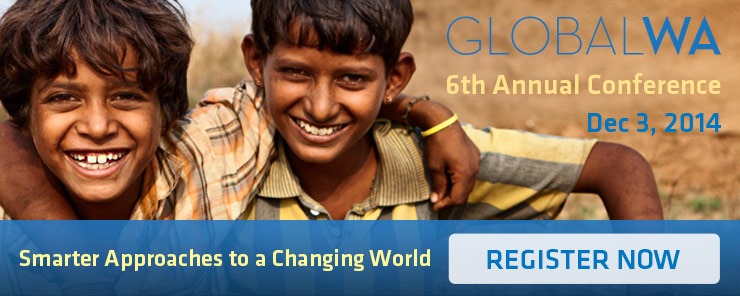
Back to Top
Question of the Month
GlobalWA will ask you a question every month and synthesize the responses and make available to our member organizations. Please take a moment to respond to the question for this month:
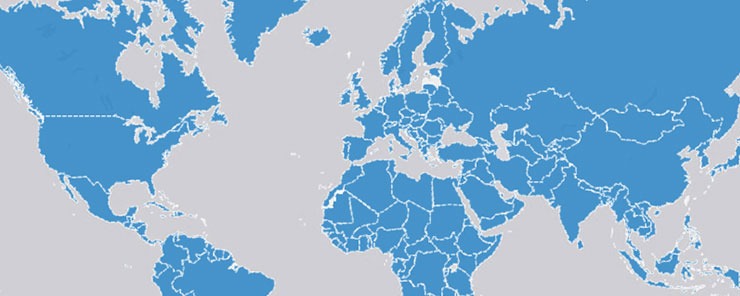
Have you seen our new interactive member map? It can be viewed on our website at: https://globalwa.org/our-members/member-map/
Thoughts? Comments? Member data updates?
We would love your feedback as we showcase our member organizations and the Washington state global development community.
Please click here to to leave feedback.
Back to Top
Featured Organization
Global Visionaries
By Liv Froehlich
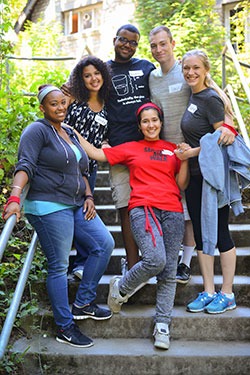 During last month’s United Nations Climate Summit, more than 400,000 people took to the streets of New York and other cities across the globe to participate in the largest mobilization of climate activism the world has ever seen. In a time of multiple global problems such as climate change, racial and ethnic tensions, resource shortages, wars and class disparity, these demonstrations exemplify the desire to find solutions to seemingly insurmountable global challenges.
During last month’s United Nations Climate Summit, more than 400,000 people took to the streets of New York and other cities across the globe to participate in the largest mobilization of climate activism the world has ever seen. In a time of multiple global problems such as climate change, racial and ethnic tensions, resource shortages, wars and class disparity, these demonstrations exemplify the desire to find solutions to seemingly insurmountable global challenges.
Chris Fontana, executive director of Seattle-based Global Visionaries, believes that our youth have a major role to play.
“In the same way that youth, throughout history, have been at the forefront of change, we need to recognize today that we operate in a world where youth are discriminated against because of their age and they aren’t given their due,” Fontana said. Global Visionaries (GV) is looking to change this by recognizing the power of youth in shaping our future and tackling global issues.
Stepping into the GV office, it seems fitting that it has established its home inside of a repurposed school building in Seattle’s Beacon Hill neighborhood. The organization itself functions as a platform for youth to become change makers and “repurpose” traditional views on education and learning through a variety of programs.
“You can’t teach responsibility for the planet, you can only share it.” said Fontana.
In practice, GV has implemented its democratic pedagogy in a number of ways. The organization began in 1997. At the time, Fontana was working as a Spanish teacher at Islander Middle School on Mercer Island. Driven by a desire to instill in his students the principals of global stewardship and accountability, he began to lead trips to Guatemala.
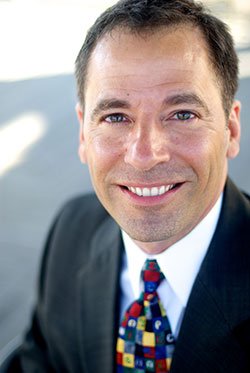
Chris Fontana, Executive Director
What initially began as a small trip of five students “pitching in” on community projects has since expanded over the past 18 years into a way of sharing knowledge through leadership programs, in-school and afterschool classes and curriculum and a local youth board. Today, there are close to 4,000 GV alums, with almost 220 students from both Seattle and Guatemala participating in its Leadership Program each year. Through partnerships with municipal governments and local community organizations, these students have helped to build entire schools, work in hospitals and aid in reforestation efforts (with an average of 4,000 trees being planted per year).
While the community work that students do over the course of the program is certainly impressive, it is the broader themes that are instilled in participants that make this program exceptionally unique. As Fontana explains, “Rather than presenting a world view, it is about presenting them with the tools to create a new world view.”
Students who have already participated in GV programs have the option of continuing to work with the organization as part of its Youth Board and through internships. Roughly 35 percent choose to do so. Indeed, the office is often full of past participants who are now facilitating Leadership Program discussions on the topics of racism, classism, sexism and imperialism.
“Throughout the course of the program, [students] come to the deep realization that we are all in this together and we have a stake in the creation of disparity and the creation of equality,” said Fontana.
An integral part of all GV programs is the diversity of its students. Emphasizing the importance of learning from one another, Fontana explained that, by design, students work with people from very different and diverse backgrounds. The organization works to remove barriers to participation by hosting application workshops at schools, organizing scholarships and including fundraising as a mandatory part of the Leadership Program.
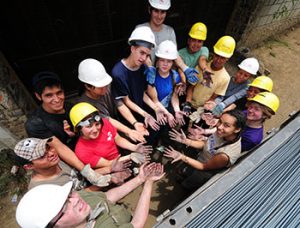 Part of the reason for GV’s success, aside from a powerful student leadership contingency, has been the partnerships that it has formed with Seattle schools and teachers. Recognizing that progress requires a fundamental paradigm shift within schools, GV has begun to host week-long “train the trainer” workshops for teachers and educators. Teachers have taken their knowledge from these workshops and begun to implement global leadership classes in a number of schools in the Seattle area. This curriculum engages students in the most pressing issues they face in the 21st century including climate change, resource depletion, poverty, and education reform. Teachers act as facilitators, while students are accountable for the generation and retention of content through listening and collaborating with their peers. From this, teachers are able to legitimize young people and encourage them to become engaged leaders and public citizens.
Part of the reason for GV’s success, aside from a powerful student leadership contingency, has been the partnerships that it has formed with Seattle schools and teachers. Recognizing that progress requires a fundamental paradigm shift within schools, GV has begun to host week-long “train the trainer” workshops for teachers and educators. Teachers have taken their knowledge from these workshops and begun to implement global leadership classes in a number of schools in the Seattle area. This curriculum engages students in the most pressing issues they face in the 21st century including climate change, resource depletion, poverty, and education reform. Teachers act as facilitators, while students are accountable for the generation and retention of content through listening and collaborating with their peers. From this, teachers are able to legitimize young people and encourage them to become engaged leaders and public citizens.
“Whatever professional path they choose in life is secondary to the way they live,” said Fontana.” He said that he receives regularly from GV alums stories about where they are now living across the globe, organizing farm workers and working with food justice and communities of color. In every example, these individuals are full of passion that will undoubtedly do exactly what the program intended – help create a just, equitable and sustainable future.
Back to Top
Changemaker
Rick Beckett, President & CEO, Global Partnerships
By Dean Forbes
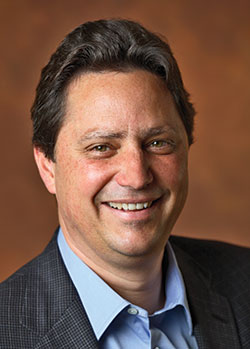 How do you combine traditional charitable giving, enlightened public policy and market-based solutions to lift hundreds of millions of people out of extreme poverty? That’s a question that Seattle-based Global Partnerships has been working on for 20 years. Its focus is on the latter in the form of investing philanthropic and investor dollars into local microfinance institutions, social businesses and cooperatives to create opportunities for impoverished persons to access credit to start a small business and to obtain essential services such as healthcare.
How do you combine traditional charitable giving, enlightened public policy and market-based solutions to lift hundreds of millions of people out of extreme poverty? That’s a question that Seattle-based Global Partnerships has been working on for 20 years. Its focus is on the latter in the form of investing philanthropic and investor dollars into local microfinance institutions, social businesses and cooperatives to create opportunities for impoverished persons to access credit to start a small business and to obtain essential services such as healthcare.
Global Partnerships (GP) celebrates its 20th anniversary this fall. Founded in 1994 by Bill and Paula Clapp, it started out as a private foundation that used grants funded by philanthropy to pioneer microfinance work in Central America. Today, the non-profit is a self-described “impact investor” by using its own social investment funds and charitable donations to invest in market-based solutions in 12 countries in Latin America and the Caribbean. Global Partnerships says its mission to expand opportunity for people living in poverty reflects the organization’s “belief that markets have an essential role to play in bringing meaningful and sustainable opportunity to millions of people living in poverty.”
According to its latest statistics, GP has served two million people by investing more than $132 million in 73 partner institutions in microfinance, social businesses and cooperatives. GP focuses on four “impact areas:” Health services, rural livelihoods, green technology and “microentrepreneurship.” Women comprise 77 percent of the people the partners serve.
Microfinance, social investing, social enterprises, and impact investment: What does all of this mean in the world of global development and how does it help the impoverished? CEO Rick Beckett agreed to participate in an interview with Global Washington to explain how its brand of “impact investing” has changed the lives of people.
GlobalWA: Global Partnerships’ approach to poverty alleviation has evolved over the years. What are a few of the most significant changes that have taken place and what has been their impact?
Rick Beckett: While our organization has evolved, what has not changed is our mission. Global Partnerships’ mission is to expand opportunity for people living in poverty. Everything we do is dedicated to that purpose. GP spent its first decade as a grant maker in the early days of microfinance. It played a pioneering role, as did others, in demonstrating that microfinance could serve as an impactful, sustainable and market-scaled solution to global poverty.
As we reflect back over 20 years, we see how learning from our early work in microfinance has shaped our current strategy as a nonprofit impact investor. We learned that it takes more than a small loan to make a real difference, and our investments in micro entrepreneurship and rural livelihoods reflect emerging best practices in combining access to credit with the training and access to markets that are required to help people living in poverty stabilize and increase their incomes.
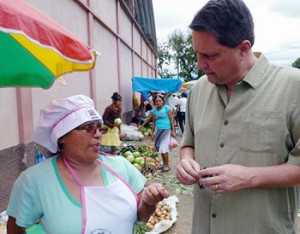 We recognized that one of the great challenges in global development – actually getting basic products and services into the hands of impoverished families – can be tackled, in part, by leveraging the sustainable delivery channels created by microfinance. This insight is guiding our investments in health education, essential medicines and health services. And we learned that markets can expand opportunity on a global scale. Nowhere is this more clearly demonstrated than through microfinance which now reaches almost 200 million families worldwide. GP’s most recent investments in creating access to solar lights for impoverished, off-the-grid households reflects our belief that, like microfinance, these technologies will not only have a significant positive impact, they are likely to achieve social impact on a global basis.
We recognized that one of the great challenges in global development – actually getting basic products and services into the hands of impoverished families – can be tackled, in part, by leveraging the sustainable delivery channels created by microfinance. This insight is guiding our investments in health education, essential medicines and health services. And we learned that markets can expand opportunity on a global scale. Nowhere is this more clearly demonstrated than through microfinance which now reaches almost 200 million families worldwide. GP’s most recent investments in creating access to solar lights for impoverished, off-the-grid households reflects our belief that, like microfinance, these technologies will not only have a significant positive impact, they are likely to achieve social impact on a global basis.
Perhaps the most profound lesson we have learned that has most affected our strategy is this: In order to bring opportunity to millions of people living in poverty, we need to think differently about capital. Ten years ago, before “impact investing” had burst onto the world stage, we realized that both philanthropic and investment capital are needed to unlock market-based solutions to poverty. Philanthropy fuels innovation, funds learning and leads the way. Mission-centered, impact-led investment capital sustains and grows market-based solutions to poverty. By embracing a different mindset and this hybrid approach, GP has been able to increase its impact from 23,000 lives touched to more than 2.5 million lives touched in less than a decade.
GlobalWA: Speaking of impact, Global Partnerships describes itself as an impact investor. For readers unfamiliar with this language, what is impact investing and how is it different from traditional investing?
Beckett: When we use the term impact investing, we are referring to the growing number of individuals and institutions that want to reflect their values in their investing. These investors are going beyond “doing less harm,” which means screening out and avoiding investments that harm people and the planet (and also called socially responsible investing), to “doing more good,” which means investing in things that have a clear, positive purpose. Such purposes might include things like building affordable housing or commercialization of low carbon sources of energy or financing school construction in low income communities or creating economic opportunity for people living on a few dollars per day in the developing world.
Traditional investing seeks maximum risk-adjusted financial returns. It’s about the money. Impact investing seeks a genuine double or triple bottom line – including financial, social, and environmental returns – that better reflect an investor’s values and the world they want to pass on to future generations.
GlobalWA: GP states that markets have an essential role to play in bringing meaningful opportunity to people living in poverty. Why?
Beckett: For the simple reason that good government, smart policy, public funding, effective partnerships and charitable endeavors are all necessary and essential but they are not sufficient to address global poverty.
If we want billions of people living in poverty to have a chance to earn a living and improve their own lives, we have to harness market forces for good. We need markets to create inclusive economic opportunity. We need them to bring basic, affordable goods and services to people who are living without them.
We believe that it will take an “all of the above” approach – private, public and social sectors doing what they do best – to address global poverty.
GlobalWA: What is the attraction of your social investment funds to investors if financial return is not as high as in traditional investments?
Beckett: Over the past 36 consecutive quarters, GP’s social investment funds have delivered consistent, fixed income returns as targeted to all fund investors. That said, the reason investors get involved in our funds is because they find the social impact compelling. They value the “social return” alongside the “financial return.” They appreciate the opportunity to have some of their assets at work in the world making a real difference.
GlobalWA: Global Partnerships works throughout Latin America and the Caribbean. How do you decide where to work?
Beckett: We began our work in four of the poorer countries in Central America, and have expanded our reach to a total of twelve countries since our inception.
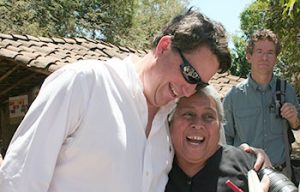 We take an “edge out” approach to growth. GP broadens the kind of opportunity in which it invests – from microfinance in the beginning to micro entrepreneurship, rural livelihoods, health and solar lights today – as we become convinced of positive impact in the lives of people living in poverty. GP expands the types of social enterprises in which it invests – from microfinance institutions to cooperatives to social businesses – as we become convinced that these types of partners can effectively and sustainably deliver high impact products and services to the people we exist to serve. And GP enters new countries as we become convinced that there is high impact work going on and that there are social enterprise partners in which we can invest.
We take an “edge out” approach to growth. GP broadens the kind of opportunity in which it invests – from microfinance in the beginning to micro entrepreneurship, rural livelihoods, health and solar lights today – as we become convinced of positive impact in the lives of people living in poverty. GP expands the types of social enterprises in which it invests – from microfinance institutions to cooperatives to social businesses – as we become convinced that these types of partners can effectively and sustainably deliver high impact products and services to the people we exist to serve. And GP enters new countries as we become convinced that there is high impact work going on and that there are social enterprise partners in which we can invest.
As we look to the future, we are exploring East Africa as a next frontier. In part, this is because Africa experiences the deepest, most pervasive and persistent rates of poverty in the world. Also, it is because we believe that social enterprises in East Africa need the kind of mission-centered, impact-led investment that GP provides.
Back to Top
GlobalWA On the Ground
Mangrove Action Project
By Holly Koch
This is the first in a series of articles written by Holly Koch, former GlobalWA intern and now half of the Adventure in Focus duo. While traveling throughout Southeast Asia, AIF is documenting the projects of several GlobalWA member organizations that are working on the ground in the region. Holly submitted this article from Thailand, while working with Mangrove Action Project.
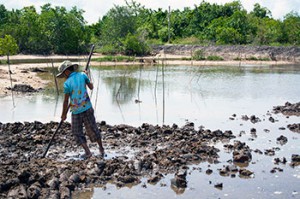 As the Pacific Northwest readies itself for the chilly showers of fall and the icy roads of winter, Thailand is preparing for the end of its monsoon season, bringing with it clear skies and an influx of international tourists. While many will head to the Andaman coast, pulled by the allure of its paradise-like beaches, organizations like Mangrove Action Project (MAP) are drawn by the importance of its coastal forests.
As the Pacific Northwest readies itself for the chilly showers of fall and the icy roads of winter, Thailand is preparing for the end of its monsoon season, bringing with it clear skies and an influx of international tourists. While many will head to the Andaman coast, pulled by the allure of its paradise-like beaches, organizations like Mangrove Action Project (MAP) are drawn by the importance of its coastal forests.
Nearly 520 miles south of Bangkok, in what guidebooks describe as Thailand’s “Deep South,” is the city of Trang. Remote enough to appease its operations budget; serviceable enough to access Bangkok by plane, train, and automobile; and a stone’s throw from the mangroves the organization has dedicated itself to preserve and restore, the city has been a convenient home for MAP Asia’s operations.
As interns, we spent the last month hungrily absorbing information from conversations about mangroves, conservation and government-relations in Thailand, eagerly accepting any chance to accompany the staff into the field in an attempt to understand MAP’s on-the-ground presence. What we discovered over countless iced coffees and bowls of hot noodles is a group of people who live and breathe the work they do.
“People always think we’re much bigger than we are,” said Jim Enright, Coordinator for MAP Asia, with a laugh. This undoubtedly is a testament to the level of dedication the staff of three puts forth every day in the office and out in the field. Most days the lights are on until 10:00 in the evening, if not later, with the sound of typing heard from MAP’s two adjacent offices, as projects are fine-tuned, logistics are sorted and relationships are developed and maintained via email and Skype.
 Much of MAP’s work surrounds the concept of Community-Based Ecological Mangrove Restoration (CBEMR) wherein, as it sounds, community participation is paramount. From the planning stages in community meeting rooms and the homes of local project leaders to the physical work of digging canals, members of the local communities in which MAP operates are involved in every step of the restoration process.
Much of MAP’s work surrounds the concept of Community-Based Ecological Mangrove Restoration (CBEMR) wherein, as it sounds, community participation is paramount. From the planning stages in community meeting rooms and the homes of local project leaders to the physical work of digging canals, members of the local communities in which MAP operates are involved in every step of the restoration process.
Part of its relationship-building process has been the introduction of alternative livelihood programs. While certain people have the ability to take off work to attend a project meeting or to provide manual labor, that is oftentimes a luxury not afforded to subsistence farmers or fisherman.
To mitigate this, participants are compensated a day’s wages, which in turn displays MAP’s commitment and allows community members to take ownership of the conservation efforts that will restore the ecology of their villages, creating countless returns in the process. Ning Enright, Field Project Manager in Thailand, said, “They have to feel like it is their project too because, when we finish a project, the work is still there. They’re the ones who will need to continue.”
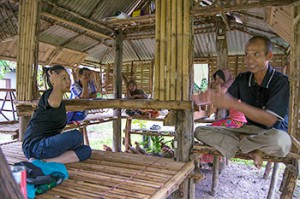 Working to ensure the posterity of their projects, MAP also involves the children of the villages. While taking time lapse photos to mark the growth of the trees, we clumsily traipsed around the mangrove restoration site, watching with admiration as the children ran from point to point among roots, crab dwellings and mud that clung like thick molasses, racing each other to be in the next photo. Por Nakornchai, a GNF Project Manager working with MAP, described their dedication to involving children. “I think of teaching conservation at a young age like teaching a language at a young age. We want kids to grow up fluent in their knowledge of protecting the environment.”
Working to ensure the posterity of their projects, MAP also involves the children of the villages. While taking time lapse photos to mark the growth of the trees, we clumsily traipsed around the mangrove restoration site, watching with admiration as the children ran from point to point among roots, crab dwellings and mud that clung like thick molasses, racing each other to be in the next photo. Por Nakornchai, a GNF Project Manager working with MAP, described their dedication to involving children. “I think of teaching conservation at a young age like teaching a language at a young age. We want kids to grow up fluent in their knowledge of protecting the environment.”
MAP Asia’s efforts have led to a strong relationship between the organization and engaged local community members, which is the backbone of any sustainable field project. The passion of the MAP Asia staff seems matched wholeheartedly by the kind and enthusiastic community members with whom we were fortunate enough to meet, talk with and shovel beside. In our eyes, these communities and the people of the Mangrove Action Project deserve each other.
Back to Top
Welcome New Members
Please welcome our newest Global Washington members. Take a moment to familiarize yourself with their work and consider opportunities for support and collaboration!
Kilimanjaro Level
Tif USA: Formerly named ISIS Group, Tif USA is currently going through a rebranding process. They work side by side with communities and children in remote areas of Nepal and Uganda to improve lives through health, education and other development projects. They also aims to change the way people think about the role of business, and the power of business/non-profit partnerships. www.isisgroup.org
Cascades Level
Global Peace Foundation, Education Division: The Education Division of Global Peace Foundation aims to transform education so that it is relevant in today’s world. They work with educators and changemakers at the grassroots, national and global levels to ensure that students graduate ready to succeed in all aspects of life in the 21st century. www.globalpeace.org
Sherris Consulting: Sherris Consulting works with clients to maximize the impact of global health investments. Current focus areas include: Developing strategies to measurably impact critical health challenges, partnering for health product development and delivery success, recruiting and mentoring global health leaders and assessing programs for sustainability and transferability. Specific health areas of focus include women’s health, family planning, women’s cancers and NCDs. www.sherrisconsulting.com
Thriive: Thriive is a nonprofit organization dedicated to building prosperity in vulnerable global communities. thriive.org
Back to Top
Member Events
October 15: Washington Women’s Foundation // Strategic Board Governance: Best Practices for Nonprofit Board Members
October 16: World Affairs Council // YPIN Networking Event
October 18: Sister Schools // 10th Annual Gala
October 29: iLEAP // Open House
November 8: Water1st International // Give Water Give Life Benefit
November 8: African Chamber of Commerce PNW // 16th Annual Africa Day Business Forum
November 13: Schools for Salone // 4th Annual Seattle Anniversary Dinner
Back to Top
Career Center
Highlighted Paid Positions
Executive Assistant – Global Partnerships
Director of Development, Advocacy, and Communications – Committee for Children
Grants Management – IDRI
Highlighted Volunteer Positions
Volunteer/Intern – Days for Girls International
Volunteer – NPH USA
For more jobs and resources, visit https://globalwa.org/resources/careers-in-development/
Back to Top
GlobalWA Events
October 20:
Ghana’s Oil for Food Initiative
October 23:
Networking Happy Hour with Friends of GlobalWA, Humanosphere and World Affairs Council
November 12:
New Member Orientation
November 13:
Executive Director Roundtable
December 3:
GlobalWA 6th Annual Conference
Back to Top
Turning Oil into Food: Sustainable Development in Ghana
Posted on October 13, 2014.
By Alex Blair, Extractive Industries Press Officer, Oxfam America, a GlobalWA member
When Ghana discovered oil in 2007, it was hoped that the resource would help transform the country’s economy. Ghana was once known as the Gold Coast, so it’s quite familiar with the risk of the “resource curse” – when countries rich in oil, gas and minerals don’t see the full benefits of that wealth. Gold hasn’t translated into development; in fact, the industry caused years of human rights and environmental problems. With oil expected to bring $1 billion to the government each year for the next 20 years, Ghana hopes to better manage these revenues in order to reduce poverty and fuel sustainable development.
Continue Reading
Citizens Across the Globe Demand Action on Climate Change
Posted on October 6, 2014.
By Liv Froehlich
On September 21 at Westlake Park in downtown Seattle, thousands congregated as part of a global movement called the People’s Climate March – the largest example of climate activism the world has ever seen, and an effort to build on the momentum generated by the UN Climate Summit which took place in New York in late September.
UN Secretary General Ban Ki-moon hosted the UN Climate Summit in an effort to encourage world leaders to engage in climate action and end the gridlock that has been surrounding climate dialogue for decades. While the active participation of global leaders at the Climate Summit was critical, it was the narratives that came out of the marches that gave a face to many of the issues being discussed in New York. The People’s Climate March was organized by the group 350.org, a grassroots climate organization, alongside more than 1,000 additional participating organizations.
Continue Reading
Small Foundations Discuss Right-Sizing Evaluation for International Giving
Posted on September 29, 2014.
By Kristen Holway, Senior Manager of Ethnography and Learning, Philanthropy Northwest
Small foundations and family funds are increasingly providing essential investments to small organizations based in developing countries. These funders tend to be nimble, tolerate risk and understand the need for both seed funding and general operating grants. However, it can be challenging to evaluate small, international investments. Evaluations are sometimes more costly than the value of the grant. Small organizations may be resource constrained and not have the capacity to conduct a robust analysis. Data can be unreliable or unavailable. And differences in race, ethnicity, power and culture can thwart meaningful relationship development and trust.
So, how can a small foundation engaged in international philanthropy right-size their evaluation expectations and practices?
Continue Reading
Ebola Crisis: UNICEF in Action
Posted on September 29, 2014.
September 2014
Humanitarian Crisis: In March 2014, the Government of Guinea formally recognized an Ebola outbreak. Before long, the outbreak spread to other countries in the region including Liberia, Sierra Leone, Nigeria and Senegal. As of September 20, 2014, over 5,335 confirmed or probable cases have been reported in the region, of which 2,622 resulted in death. These numbers are predicted to rise dramatically, with the situation worsening before it gets better. With 22 million people in need and 2.5 million children under the age of five living in Ebola-affected areas in Guinea, Liberia and Sierra Leone, and many more living in neighboring countries at-risk, UNICEF is partnering with governments, United Nations agencies and non-governmental organizations to respond to this unprecedented crisis. U.S. Fund for UNICEF is a Global Washington member.
Continue Reading
Empowering Women & Girls in Developing Countries: A Conversation With Sarah Degnan Kambou
Posted on September 22, 2014.
By Nicole Neroulias Gupte
More than 600 million adolescent girls around the world are struggling to survive child marriage, pregnancy, poverty and disease. We can help them by using research to find the right tipping points and partnerships, according to Sarah Degnan Kambou, president of the International Center of Research on Women.
Kambou discussed the ICRW’s work at a Sept. 16 lunch meeting at Seattle’s World Trade Center, including representatives from the Bill and Melinda Gates Foundation, PATH and Landesa.
Continue Reading
September 2014 Newsletter
Posted on September 16, 2014.
Welcome to the September 2014 issue of the Global Washington newsletter.
IN THIS ISSUE
Letter from our Executive Director
Washington state’s longstanding connections to the Pacific Rim are well known and important to our trade and government relations. However, did you know that Africa also has unique connections to our state?
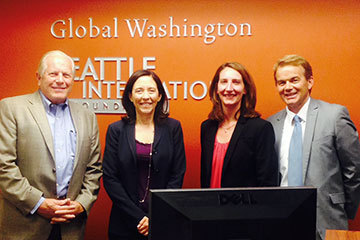
(L-R) Bill Clapp, Founder and Board Chair, Global Washington; Senator Maria Cantwell (D-WA); Kristen Dailey, Executive Director, Global Washington; Tim Hanstad, President & CEO, Landesa and Global Washington board member
Senator Maria Cantwell (D-WA) recently traveled to Ethiopia, Tanzania and Senegal to explore programs that are effective at advancing women’s empowerment and food security. The senator’s office reached out to Global Washington prior to her trip and asked us to pull together a group of for-profit and non-profit organizations for a briefing with her. We hosted representatives from Microsoft, Costco, PATH, World Vision, Landesa, Splash, the Gates Foundation, Rwanda Girl’s Initiative, Rotary International, International Leadership Academy of Ethiopia and the National Democratic Institute (NDI).
We had a fascinating conversation that underscored the multitude of connections between our state and Africa. There are over 63 Global Washington members working in Africa that address challenges in global health, economic empowerment, land rights, government transparency, food security and more.
In addition to Africa, there are 52 Global Washington members working in Asia and 45 in Latin America. Washington state is increasingly known as a hub for international non-profits and philanthropists, all of which are working to improve the lives of people in developing countries. These organizations have made tremendous impacts and are moving the needle to make the world a better and safer place. For example, programs by PATH and World Vision alone impact an estimated 339 million people in a single year.
NGOs and philanthropists, alongside for-profit companies and academic institutions in our state, are developing innovative solutions to tackle many of the world’s most complex challenges. I believe that Washington should be known as the premier state for international development in addition to our reputation for being the home of many forward-thinking companies. I truly believe the work of Global Washington members is one of our state’s most valuable exports.

Kristen Dailey
Executive Director
Back to Top

GlobalWA will ask you a question every month and synthesize the responses and make available to our member organizations. Please take a moment to respond to the question for this month:
Are you going to the Independent Sector National Conference taking place in Seattle this November 16-18?
Please click here to respond.
Back to Top

Have you registered for the GlobalWA 6th Annual Conference? New sessions and speakers announced. Early bird rates end soon!
Back to Top
Featured Organization
Snow Leopard Trust
By Gailyn Portelance
For years, Brad Rutherford only heard stories of conflict regarding the relationship between wolves and ranchers in the U.S., elephants and farmers in Africa and snow leopards and herders in Asia. When members of Snow Leopard Trust first spent time with herder communities in snow leopard habitats, snow leopards were considered the enemy of these communities because the big cats preyed on valuable livestock.
Today, things are different. Herder communities in the five most important snow leopard regions (China, India, Kyrgyzstan, Mongolia and Pakistan) have learned to live peacefully with these animals through the development of a positive coexistence.

Snow Leopard Trust (SLT), a new Global Washington member, is the largest and oldest non-profit organization that works to increase the endangered snow leopard population worldwide by addressing threats such as persecution from herders, habitat degradation and poaching. They do so by championing community-based conservation practices.
“We believe that the only way to achieve this goal is through a balanced approach that considers the needs of local people and the environment,” said Rutherford, Executive Director of SLT. “Without cooperation from people who share a common habitat with the snow leopard, this iconic big cat can’t be saved.”
Founded in 1981 by Helen Freeman, Snow Leopard Trust began developing community-based conservation programs in Mongolia in the late 1990s around informal talks to solve herder‑snow leopard conflict. Conversations with Mongolian women revealed that they wanted to find a way to gain more income from their livestock. Of these discussions, Rutherford says, “It made sense to leverage these skills and the abundance of livestock wool.”
A handicraft program called Snow Leopard Enterprises was born, which provides equipment and training so herders can create handmade items from livestock wool. SLT then purchases these items to be sold online. Community members also sign a snow leopard conservation agreement and, if the community follows the agreement, it receives an additional cash bonus at the end of the year. In 2013, herders earned more than $50,000 in handicraft sales.[1]
SLT didn’t stop there.
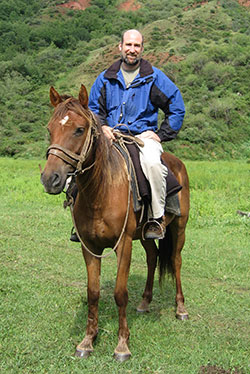
Brad Rutherford, Executive Director of Snow Leopard Trust
“In Pakistan, herders told us that the greatest threat to their food security was loss of livestock to common diseases,” said Rutherford. SLT decided to help herders vaccinate their livestock, so herds could become healthier and excess livestock could be sold in the market. This allowed herders to gain revenue that far exceeds the value of livestock occasionally killed by snow leopards.
SLT also developed programs in India, where herders expressed interest in support of a program that would give them direct monetary compensation for any livestock losses. “Now, they run multiple and very successful livestock insurance programs,” said Rutherford.
These three programs show the diversity of ways SLT engages with communities to protect snow leopards. Each program varies significantly by country depending on the local contexts and resources available.
“We don’t go into a snow leopard range country thinking we know all the answers,” Rutherford said. “We find that by listening to local people, asking questions and sharing our goals, we can often work together to come up with constructive ways to solve human-wildlife problems.”
In addition to working at the local level to protect snow leopard habitats, national-level partnerships are an integral piece to the puzzle. SLT works with all 12 snow leopard range countries, and with the Global Snow Leopard and Ecosystem Protection Plan, and it hopes to help countries create at least 20 landscapes large enough to support 100 snow leopards by 2020. SLT supports this plan in partnership with the President of Kyrgyzstan, the World Bank and other NGOs, which speaks to the international attention and support of SLT’s initiatives.
SLT also works with children to help secure a safe future for snow leopard populations. It has educational outreach programs through in-school nature clubs and summer eco-camps for youth, involving over 1,300 children in 2013.[2]
“We find that by connecting with local children, we help secure a safer future for the snow leopard. These camps connect children on a deep level with the very special habitat that they share with unique animals and plants, and they instill a sense of pride and ownership in these children,” said Rutherford.
SLT also has herder education programs to help communities understand the leopard, and they are tailored to meet the needs of each community.
 Through these partnerships and programs, SLT does an incredible job of dispelling the myth that humans and wildlife cannot coexist positively. “All these programs bring benefits to the people while bringing protection to snow leopards and the entire ecosystem,” said Rutherford.
Through these partnerships and programs, SLT does an incredible job of dispelling the myth that humans and wildlife cannot coexist positively. “All these programs bring benefits to the people while bringing protection to snow leopards and the entire ecosystem,” said Rutherford.
These efforts have a wide variety of positive effects. With the help of SLT, herder communities in northern India created two predator-proof corrals for cashmere-yielding goats. They only lost two goats, compared with 20 the year before. In Mongolia, a young herder lost livestock to snow leopards, but a neighbor was able to tell him about the handicraft program. He is now a Snow Leopard Enterprise participant, with regular income from the program helping him to compensate for livestock losses.[3] In Kyrgyzstan, Snow Leopard Enterprise communities are now helping to protect the snow leopard by denying aid, accommodation and guiding assistance to outside hunters in the region.
It’s safe to say that the positive benefits of these programs on both sides are causing an explosion in popularity, and the future of the snow leopard can only get brighter due to increased community participation. Look at SLT’s success on social media – the Facebook page alone has over 300,000 followers.
“The beauty of these programs is that they break the false choice of either helping wildlife or helping people,” said Rutherford.
1 http://www.snowleopard.org/downloads/2013_slt_annual_report.pdf
2 http://www.snowleopard.org/downloads/2013_slt_annual_report.pdf
3 http://www.snowleopard.org/downloads/2013_spring_slt_newsletter.pdf
Back to Top
Changemaker
Steven Atamian, Co-Founder and Chief Empowerment Officer, Global Brigades
By Michelle McMillan
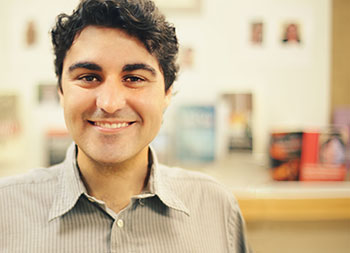 When Steven Atamian travelled to Honduras in 2003 to do medical relief work with a group from Marquette University, he “fell in love with the Honduran culture and people, and wanted to empower others to have the opportunity to work alongside these inspiring communities.”
When Steven Atamian travelled to Honduras in 2003 to do medical relief work with a group from Marquette University, he “fell in love with the Honduran culture and people, and wanted to empower others to have the opportunity to work alongside these inspiring communities.”
The need for medical clinics in Honduran communities was clear to Atamian, watching hundreds walk for miles for basic health services on a daily basis, and he was encouraged by their desire for support and also the passion of Marquette volunteers to contribute. The Marquette group, made up of students and medical professional volunteers, was working with one Honduran organization, Sociedad Amigos de los Niños. Students raised funds to participate in the program and make the trip, but little was retained for ongoing operations.
Atamian, then working in the for-profit world for Deloitte & Touche, not only had an itch to continue his volunteer work in Central America, he wanted to expand on the idea of universities partnering with local communities to provide regular access to mobile medicine. The idea was to mobilize “brigades” of volunteers to work on projects where previous groups left off and have them raise additional funds to hire full-time local staff to do follow up when they weren’t there.
In 2004, along with three partners, Atamian founded Global Medical Brigades. The organization empowered students from U.S. colleges to set up their own chapters and more students got involved. Global Medical Brigades eventually had the resources to hire more local people and create a more sustainable health system.
“On my first visit, I saw how much desire and motivation locals had to improve their communities, but they lacked capacity. From then on, I knew it was about creating an organization whose main goal was empowering local workers,” said Atamian. “I saw them working with their counterparts effectively, I saw them doing it better than we can as North Americans, and I wanted to set up the structure to give them as many resources as possible to do better work.”
In 2008, Global Brigades’ focus shifted from medical relief to a more holistic model of sustainable health and development work. In addition to working in Honduras, the group expanded to Ghana, Nicaragua and Panama. Programs offered grew in number and focus, encompassing public health, human rights, environment and business.
“We were just responding to community needs,” explained Atamian. “If they said they needed a water system, we would bring in engineers and workers to build up the water system.”
As the group’s focus broadened, it dropped “medical” and changed the organization’s name to Global Brigades.
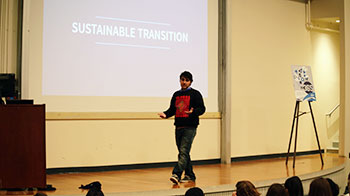 Something else changed. “From 2004 to 2008, I was just a volunteer, working for Deloitte full-time during the day and doing Global Brigades work on nights and weekends,” said Atamian, a University of Southern California graduate with a B.S. in Business Administration and a B.A. in International Relations. With the organization gaining momentum, the board asked a few of the founders to take on work at Global Brigades full-time.
Something else changed. “From 2004 to 2008, I was just a volunteer, working for Deloitte full-time during the day and doing Global Brigades work on nights and weekends,” said Atamian, a University of Southern California graduate with a B.S. in Business Administration and a B.A. in International Relations. With the organization gaining momentum, the board asked a few of the founders to take on work at Global Brigades full-time.
“Frankly, we never really had that intention. It was always our passion project and we all had other full-time jobs,” said Atamian. However, he quickly took on the role of Chief Empowerment Officer for Global Brigades. “My role as a leader within the organization is to empower the team around me, to attract talented people and then not micromanage them,” he said.
Atamian always wants to give his team ownership of programs, and greatly emphasizes the theme of empowerment throughout the organization. Students are encouraged to set up and lead their own chapters, and in-country teams are given the resources to develop programs based on student and community feedback.
“Really, the job of our international organization is to stay out of the way. It’s just to create an infrastructure where exchanges between students and communities happen,” said Atamian. “To me, that’s not the job of a top-down executive, but an empowering leadership team, and that’s what we try to model. So really, I am only speaking on behalf of the students and the in-country team members. I would like to stay as invisible as possible, but if I have an opportunity to talk about the good work that they’re doing, then I’m very excited to do that. It wouldn’t be empowering otherwise.”
Global Brigades stands apart from other volunteer groups in that it focuses on building in-country capacity to carry out development projects. “We want to stay as small as we can in North America and Europe, and make sure that there are really effective on-the-ground teams that are doing work year-round within the communities,” said Atamian. With the vision of creating a more equal world, the organization ultimately aims to transition their brigades out of communities once projects are completed.
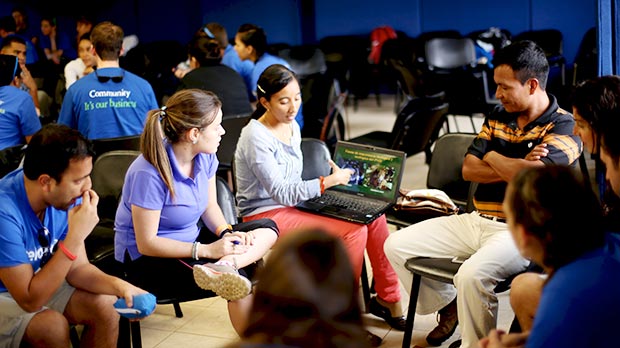
“In 2013, we transitioned out of our first community in Zurzular, Honduras, and what that means is that we no longer need our development program volunteers to go to that community,” said Atamian. The community now has its own bank run by locals, its own water system monitored by a local committee and its own public health committee. There is also enough money in the community’s reserves to keep things running without volunteers. Just last month, Global Brigades celebrated their second sustainable transition in El Ojochal, Honduras.
“The fact that communities can take ownership of these projects, that’s our biggest achievement. And the fact that short-term volunteers, who a lot of people are so critical of, drive this organization, is very inspiring to me,” said Atamian. “Short-term volunteers are just one piece of a larger system. Development work, if done with the right local infrastructure, can be done very effectively with just the very basic ideas of empowerment and getting students involved.”
To learn more about the work of Global Brigades and how to get involved, visit its website.
Back to Top
Member Recognition
2014 International Day of Peace: How the World Justice Project is Advancing the Rule of Law for a More Peaceful World
By Hannah Atlas
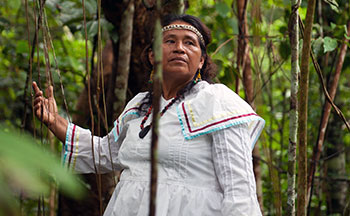
Credit: WJP/Deborah Espinosa
In 1981, the United Nations General Assembly declared Sept. 21 the “International Day of Peace” dedicated to promoting the ideals of peace among all nations and peoples. This year’s Day of Peace honors the 30th anniversary of the General Assembly Declaration on the Right of Peoples to Peace and reminds us of the very principles and purposes upon which the UN was founded. The declaration proclaims that “the peoples of our planet have a sacred right to peace” and it is the “fundamental obligation of each State” to protect that right. It is the UN’s hope that this day will highlight the importance of accountability and transparency and reaffirm the possibility of peace.
Woven into this year’s theme is the UN’s 2013 “Rights Up Front” initiative that calls on international actors to take early and concerted action when responding to and prosecuting human rights violations. For its part, Secretary General Ban Ki-moon is working to strengthen the UN’s internal preparedness system in terms of the available funds, resources and an effective protocol to deal with evolving crisis.
But other members of the global development community are also working towards peace and security. Global Washington member World Justice Project (WJP) believes that the rule of law is the cornerstone of peace, security, sustainable development and equality. According to the WJP, establishing the rule of law – the system of rules and rights that enables fair and functioning societies – is fundamental for countries to achieve economic development, accountable government and respect for human rights.
Founded in 2006, with offices in Seattle and Washington, D.C., the WJP is building a diverse, cross-sector network to strengthen the rule of law around the world. The WJP believes that the most effective way to advance the rule of law is through collaboration among a broad range of stakeholders. WJP does this through multiple programs, beginning with research and measurement, and moving towards action.
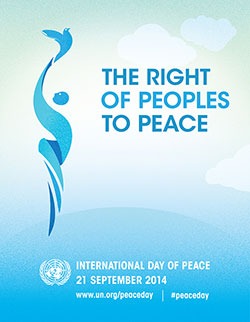
To measure how well countries actually adhere to the rule of law in practice, the WJP created a Rule of Law Index, which measures how the rule of law is experienced by ordinary people around the globe. To date, over 100,000 citizens and experts have been interviewed in 99 countries. The data is visually displayed online in an interactive map that scores and ranks countries across eight different rule of law factors. Their findings have been reported on in more than 500 media outlets in over 80 countries around the world.
To encourage countries to take action where the rule of law is weak, the WJP convenes a variety of conferences, workshops and regional meetings. At these events, participants are encouraged to incubate local solutions to issues such as corruption, human trafficking and vigilante justice, among others. The top solutions incubated at WJP events become pilot programs funded by seed grants through its World Justice Challenge, an online seed grant competition.
What makes these pilot programs unusual is that the ideas are born from unlikely sources and collaborators. The WJP catalyzes new ideas from individuals and organizations who do not traditionally consider themselves as part of the rule of law sector – such as artists, athletes and engineers. As a result, the WJP has supported a variety of pilot programs such as a program for musicians, work with lawyers to ensure their intellectual property rights, a program for health workers in Cameroon to tackle corruption around HIV/AIDS medicines in free clinics, a program in Kuwait helping to protect domestic workers, and helping environmentalists in China working with victims of pollution to hold dirty industries accountable.
To learn more about these pilot programs, see the WJP’s newly launched photo essay series, beginning with highlights of an environmental news platform created in Peru which has raised awareness about extractive industries and helped an indigenous community in the Amazon protect their land rights.

Credit: WJP
The unique work of the World Justice Project honors the “Right of Peoples to Peace” and demonstrates the organization’s commitment to freedom and accountability under law. The conversation the World Justice Project hopes to spark is one that is honest and practical, and that examines what each of us can do to build peace in our own communities.
Back to Top
Welcome New Members
Please welcome our newest Global Washington members. Take a moment to familiarize yourself with their work and consider opportunities for support and collaboration!
Don Baker Design, LLC: Don Baker is a freelance graphic designer, illustrator, animator and web designer located in Seattle, interested in working with nonprofits in the global development community. www.don-baker.com
PSI: PSI is dedicated to improving the health of people in the developing world by focusing on challenges such as: lack of family planning, HIV and AIDS, barriers to maternal health, and the greatest threats to children under five including malaria, diarrhea, pneumonia and malnutrition. www.psi.org
Member Events
Back to Top
Career Center
Highlighted Paid Positions
Operations Manager – Splash
Impact Evaluation Officer – Global Partnerships
Highlighted Internship Positions
Undergraduate Intern, Maternal and Child Survival Project -PATH
Database Design Intern – Landesa
Highlighted Volunteer Positions
Volunteer – Global Partnerships
Volunteer/Intern – Days for GirlsInternational
For more jobs and resources, visit https://globalwa.org/strengthen/careers-in-development/
Back to Top
GlobalWA Events
September 18:
Networking Happy Hour with Friends of GlobalWA, Humanosphere and World Affairs Council
September 22:
Bringing Down the Walls: The Networked Nonprofit with Jane Wei-Skillern
September 25:
NGO Roundtable Meeting with Adam Smith
September 30:
Last day for Early Bird rate – Global Washington 6th Annual Conference
October 9:
Executive Director Roundtable
Back to Top
September Roundtable Recap: Highlights from the U.S.-Africa Leaders Summit
Posted on September 15, 2014.
By Liv Froehlich
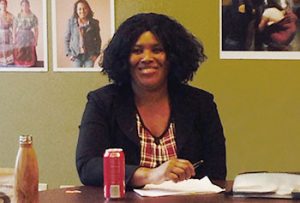 The first ever U.S. – Africa Leaders Summit was held in Washington, D.C. August 4-6. Themed “Investing in the Next Generation,” representatives from 49 African countries participated in the event hosted by President Barack Obama. The Summit aimed to strengthen ties between the U.S. and Africa by focusing on trade and investment in the region, as well as highlighting America’s support of Africans and the security and development of the continent.
The first ever U.S. – Africa Leaders Summit was held in Washington, D.C. August 4-6. Themed “Investing in the Next Generation,” representatives from 49 African countries participated in the event hosted by President Barack Obama. The Summit aimed to strengthen ties between the U.S. and Africa by focusing on trade and investment in the region, as well as highlighting America’s support of Africans and the security and development of the continent.
Aze Malawo, a Seattle-based international development consultant who attended the Summit, led Global Washington’s September Executive Director Roundtable where she recapped the event and spoke about the road ahead.Malawo, originally from Zambia, focuses her work on socio-economic development and provides advisory services to numerous organizations, including the African Union Mission. Malawo was joined at the roundtable by a number of Global Washington members whose work is focused in Africa.
Continue Reading
Startling amount of violence faced by children – UNICEF report
Posted on September 15, 2014.
Humanosphere, a Global Washington member, covers global health, poverty and inequity. They are a go-to news source for news, conversation and analysis around global development issues. In this article, they recap a recent UNICEF report on the amount of violence faced by children worldwide. UNICEF USA is also a Global Washington member.
By Tom Murphy
It is one of the shocking facts revealed in a new report on violence children face, by the United Nations’ Children’s rights and emergency relief organization (UNICEF). The report finds that children are exposed to violence both directly and indirectly at a very young age. One out of every three children between 13 and 15 are bullied. Then there is the fact that 80% of children between the ages of 2 and 14 are ‘subjected to some kind of violent discipline in the home.’ Hidden in Plain Sight brings together data on violence from 190 countries to provide a picture of what children face today.
Read more: http://www.humanosphere.org/human-rights/2014/09/startling-amount-violence-faced-children-finds-report/
Associates in Cultural Exchange: Making the World Your Community
Posted on September 8, 2014.
By Sam Wolff
As its name implies, the Associates in Cultural Exchange (ACE) was founded to foster cross-cultural friendships, communication and understanding. Founded in Seattle in 1973, ACE provides language and cultural programs for students of all ages, international study tours and facilitation for other international ventures, all of which fall under this Global Washington member’s mission of “making the world your community.”
Continue Reading
 During last month’s United Nations Climate Summit, more than 400,000 people took to the streets of New York and other cities across the globe to participate in the largest mobilization of climate activism the world has ever seen. In a time of multiple global problems such as climate change, racial and ethnic tensions, resource shortages, wars and class disparity, these demonstrations exemplify the desire to find solutions to seemingly insurmountable global challenges.
During last month’s United Nations Climate Summit, more than 400,000 people took to the streets of New York and other cities across the globe to participate in the largest mobilization of climate activism the world has ever seen. In a time of multiple global problems such as climate change, racial and ethnic tensions, resource shortages, wars and class disparity, these demonstrations exemplify the desire to find solutions to seemingly insurmountable global challenges.
 Part of the reason for GV’s success, aside from a powerful student leadership contingency, has been the partnerships that it has formed with Seattle schools and teachers. Recognizing that progress requires a fundamental paradigm shift within schools, GV has begun to host week-long “train the trainer” workshops for teachers and educators. Teachers have taken their knowledge from these workshops and begun to implement global leadership classes in a number of schools in the Seattle area. This curriculum engages students in the most pressing issues they face in the 21st century including climate change, resource depletion, poverty, and education reform. Teachers act as facilitators, while students are accountable for the generation and retention of content through listening and collaborating with their peers. From this, teachers are able to legitimize young people and encourage them to become engaged leaders and public citizens.
Part of the reason for GV’s success, aside from a powerful student leadership contingency, has been the partnerships that it has formed with Seattle schools and teachers. Recognizing that progress requires a fundamental paradigm shift within schools, GV has begun to host week-long “train the trainer” workshops for teachers and educators. Teachers have taken their knowledge from these workshops and begun to implement global leadership classes in a number of schools in the Seattle area. This curriculum engages students in the most pressing issues they face in the 21st century including climate change, resource depletion, poverty, and education reform. Teachers act as facilitators, while students are accountable for the generation and retention of content through listening and collaborating with their peers. From this, teachers are able to legitimize young people and encourage them to become engaged leaders and public citizens. How do you combine traditional charitable giving, enlightened public policy and market-based solutions to lift hundreds of millions of people out of extreme poverty? That’s a question that Seattle-based Global Partnerships has been working on for 20 years. Its focus is on the latter in the form of investing philanthropic and investor dollars into local microfinance institutions, social businesses and cooperatives to create opportunities for impoverished persons to access credit to start a small business and to obtain essential services such as healthcare.
How do you combine traditional charitable giving, enlightened public policy and market-based solutions to lift hundreds of millions of people out of extreme poverty? That’s a question that Seattle-based Global Partnerships has been working on for 20 years. Its focus is on the latter in the form of investing philanthropic and investor dollars into local microfinance institutions, social businesses and cooperatives to create opportunities for impoverished persons to access credit to start a small business and to obtain essential services such as healthcare. We recognized that one of the great challenges in global development – actually getting basic products and services into the hands of impoverished families – can be tackled, in part, by leveraging the sustainable delivery channels created by microfinance. This insight is guiding our investments in health education, essential medicines and health services. And we learned that markets can expand opportunity on a global scale. Nowhere is this more clearly demonstrated than through microfinance which now reaches almost 200 million families worldwide. GP’s most recent investments in creating access to solar lights for impoverished, off-the-grid households reflects our belief that, like microfinance, these technologies will not only have a significant positive impact, they are likely to achieve social impact on a global basis.
We recognized that one of the great challenges in global development – actually getting basic products and services into the hands of impoverished families – can be tackled, in part, by leveraging the sustainable delivery channels created by microfinance. This insight is guiding our investments in health education, essential medicines and health services. And we learned that markets can expand opportunity on a global scale. Nowhere is this more clearly demonstrated than through microfinance which now reaches almost 200 million families worldwide. GP’s most recent investments in creating access to solar lights for impoverished, off-the-grid households reflects our belief that, like microfinance, these technologies will not only have a significant positive impact, they are likely to achieve social impact on a global basis. We take an “edge out” approach to growth. GP broadens the kind of opportunity in which it invests – from microfinance in the beginning to micro entrepreneurship, rural livelihoods, health and solar lights today – as we become convinced of positive impact in the lives of people living in poverty. GP expands the types of social enterprises in which it invests – from microfinance institutions to cooperatives to social businesses – as we become convinced that these types of partners can effectively and sustainably deliver high impact products and services to the people we exist to serve. And GP enters new countries as we become convinced that there is high impact work going on and that there are social enterprise partners in which we can invest.
We take an “edge out” approach to growth. GP broadens the kind of opportunity in which it invests – from microfinance in the beginning to micro entrepreneurship, rural livelihoods, health and solar lights today – as we become convinced of positive impact in the lives of people living in poverty. GP expands the types of social enterprises in which it invests – from microfinance institutions to cooperatives to social businesses – as we become convinced that these types of partners can effectively and sustainably deliver high impact products and services to the people we exist to serve. And GP enters new countries as we become convinced that there is high impact work going on and that there are social enterprise partners in which we can invest. As the Pacific Northwest readies itself for the chilly showers of fall and the icy roads of winter, Thailand is preparing for the end of its monsoon season, bringing with it clear skies and an influx of international tourists. While many will head to the Andaman coast, pulled by the allure of its paradise-like beaches, organizations like Mangrove Action Project (MAP) are drawn by the importance of its coastal forests.
As the Pacific Northwest readies itself for the chilly showers of fall and the icy roads of winter, Thailand is preparing for the end of its monsoon season, bringing with it clear skies and an influx of international tourists. While many will head to the Andaman coast, pulled by the allure of its paradise-like beaches, organizations like Mangrove Action Project (MAP) are drawn by the importance of its coastal forests. Much of MAP’s work surrounds the concept of Community-Based Ecological Mangrove Restoration (CBEMR) wherein, as it sounds, community participation is paramount. From the planning stages in community meeting rooms and the homes of local project leaders to the physical work of digging canals, members of the local communities in which MAP operates are involved in every step of the restoration process.
Much of MAP’s work surrounds the concept of Community-Based Ecological Mangrove Restoration (CBEMR) wherein, as it sounds, community participation is paramount. From the planning stages in community meeting rooms and the homes of local project leaders to the physical work of digging canals, members of the local communities in which MAP operates are involved in every step of the restoration process. Working to ensure the posterity of their projects, MAP also involves the children of the villages. While taking time lapse photos to mark the growth of the trees, we clumsily traipsed around the mangrove restoration site, watching with admiration as the children ran from point to point among roots, crab dwellings and mud that clung like thick molasses, racing each other to be in the next photo. Por Nakornchai, a GNF Project Manager working with MAP, described their dedication to involving children. “I think of teaching conservation at a young age like teaching a language at a young age. We want kids to grow up fluent in their knowledge of protecting the environment.”
Working to ensure the posterity of their projects, MAP also involves the children of the villages. While taking time lapse photos to mark the growth of the trees, we clumsily traipsed around the mangrove restoration site, watching with admiration as the children ran from point to point among roots, crab dwellings and mud that clung like thick molasses, racing each other to be in the next photo. Por Nakornchai, a GNF Project Manager working with MAP, described their dedication to involving children. “I think of teaching conservation at a young age like teaching a language at a young age. We want kids to grow up fluent in their knowledge of protecting the environment.”







 Through these partnerships and programs, SLT does an incredible job of dispelling the myth that humans and wildlife cannot coexist positively. “All these programs bring benefits to the people while bringing protection to snow leopards and the entire ecosystem,” said Rutherford.
Through these partnerships and programs, SLT does an incredible job of dispelling the myth that humans and wildlife cannot coexist positively. “All these programs bring benefits to the people while bringing protection to snow leopards and the entire ecosystem,” said Rutherford. When Steven Atamian travelled to Honduras in 2003 to do medical relief work with a group from Marquette University, he “fell in love with the Honduran culture and people, and wanted to empower others to have the opportunity to work alongside these inspiring communities.”
When Steven Atamian travelled to Honduras in 2003 to do medical relief work with a group from Marquette University, he “fell in love with the Honduran culture and people, and wanted to empower others to have the opportunity to work alongside these inspiring communities.” Something else changed. “From 2004 to 2008, I was just a volunteer, working for Deloitte full-time during the day and doing Global Brigades work on nights and weekends,” said Atamian, a University of Southern California graduate with a B.S. in Business Administration and a B.A. in International Relations. With the organization gaining momentum, the board asked a few of the founders to take on work at Global Brigades full-time.
Something else changed. “From 2004 to 2008, I was just a volunteer, working for Deloitte full-time during the day and doing Global Brigades work on nights and weekends,” said Atamian, a University of Southern California graduate with a B.S. in Business Administration and a B.A. in International Relations. With the organization gaining momentum, the board asked a few of the founders to take on work at Global Brigades full-time.



 The first ever
The first ever